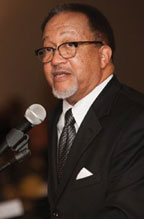 Black Press: The Voice of Black America
Black Press: The Voice of Black America
By Benjamin F. Chavis, Jr. NNPA Columnist
Part IV
To publish a document is to establish a permanent record for the future. To publish a newspaper is to preserve an official record of the news and perspectives of a particular period, which is useful today and in the future. The Black Press has been around since the publication of the first Black newspaper. Freedom’s Journal, in 1827, which had as its motto: “We wish to plead our own cause. Too long have others spoken for us.”
But Black protest has also been in the form of pamphlets. The most famous was published by David Walker, issued two years after the nation’s first Black newspaper. What was it about David Walker’s publishing his Appeal to the Coloured People of the World that made slave masters in 1829 so fearful and uncomfortable?
It was Walker’s inspiring use of the printed word that stirred the very soul and spirits of the enslaved masses of African people to rise up at all cost against the “evils” of slavery. Walker’s publication, often referred to as David Walker’s Appeal, gave the antislavery movement a resolute, charismatic voice for grassroots resistance by those held in the “clutches of slavery.”
Walker, a native of Wilmington, N.C., had relocated to Boston, in his quest to escape the overt brutality of chattel slavery in southeastern North Carolina. According to the David Walker Memorial Project, “Many historians now regard the Appeal as one of the most important social and political documents of the 19th century. Nothing like it had been published before. It remained a rallying point for African Americans for many years after Walker’s death. And it informed the thinking of generations of Black leaders, including Frederick Douglass, W.E.B. Du Bois, Martin Luther King, and Malcolm X.”
In the preamble to the Appeal, Walker emphasized, “I am fully aware, in making this appeal to my much afflicted and suffering brethren, that I shall not only be assailed by those whose greatest earthly desires are, to keep us in abject ignorance and wretchedness, and who are of the firm conviction that Heaven has designed us and our children to be slaves and beasts of burden to them and their children. I say, I do not only expect to be held up to the public as an ignorant, impudent and restless disturber of the public peace, by such avaricious creatures, as well as a mover of insubordination – and perhaps put in prison or to death, for giving a superficial ex-position of our miseries, and exposing tyrants.”
When the National Newspaper Publishers Association (NNPA) boldly asserts that we are “The Voice of Black America,” it is both to reclaim the courageous intellectual substance of a David Walker, and at the same time, continue the path charted by Freedom’s Journal.
Interestingly, David Walker also served at one time in Boston as a subscription sales agent and as a dedicated writer for New York-based Freedom’s Journal. Walker died mysteriously in 1830, one year after publication of his appeal. For 74 years, the NNPA has been publishing and distributing the printed words of liberation and news that have helped to sustain the steady advancement of the interests of Black America.
As the Black Press of America prepares to cover the upcoming U.S. – African Leaders Summit in Washington, D.C, Aug. 4-6, 2014, we are reminded of how far we have come since that September in 1829 when David Walker published his appeal. I believe that Walker was able through his faith in the God of freedom and liberation to envision a future time when a son of an African would become the President of the United States. Of course our struggle for liberation and equality has not ended. We still need a strong articulate “Voice of Black America” as the steadfast printed press complemented by the digital press to ensure that our struggle continues with effectiveness and efficiencies.



Be the first to comment